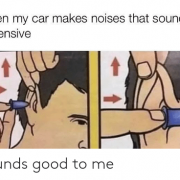My car makes a funny noise, what could it be?
We have prepared some pointers for you as to the different noises that could be coming from your car, and what they could mean.
Squeaking noise while braking
This is usually the first sign of worn brake pads. Left alone for a long time, the noise will sound like grinding metal, in that case, you’re seriously damaging your brakes. You may need to also change or skim your brake disks as well and this can be costly.
Rattling noise from the engine
There are a lot of moving parts in the engine and therefore this noise can be very confusing as it could be a number of different problems – including issues with the oil not circulating, a faulty aircon compressor or stretched or loose timing chain. When you hear any rattles in your engine, get it inspected as soon as possible.
Hissing and boiling sound from the engine
This is a signal that the engine is be overheating and can cause serious problems further down the line. When you hear that sound, stop immediately. This happens when there is perhaps a fluid leak under the bonnet, radiator leak, a leaking turbocharger pipe or a damaged intercooler.
Squeaking from the engine while driving
High pitched squeaky noise usually point to an issue with the fan belt and/or pulley. In most instances, both the belt and the pulley/tensioner will need to be replaced.
Clunking while turning
In 90% of the cases when this happens, it is because of the CV joints. These should be checked as soon as possible to avoid further damages.
Constant clicking sound from the engine while idling
This is usually, a sign that your engine is running low on oil or running on an incorrect grade of engine oil. If the noise persists after an oil top-up, have your engine checked thoroughly by a mechanic.
A loud knocking sound from the engine
This could be caused by lack of lubrication, or something has broken or lose or about to break inside the engine. The engine will need to be opened to check what could be the issue be.
Humming or growling noise from your tyres
The first thing to do when you hear a noise from your tyres is to check the pressure. If the pressure is correct, have your wheel alignment and balance checked and possibly adjusted.
Grinding noise from your gearbox
This noise is indicative of a potential problem with the clutch or transmission.
If any of these noises are coming from your car, the next mechanic is only a click away, here.
Yours in Car Care!





